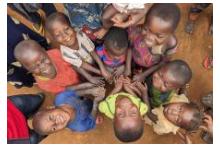Help UNICEF Reach Children at Risk in the Democratic Republic of the Congo (DRC)
op UNICEF USAThe Democratic Republic of Congo (DRC) is currently grappling with one of its worst floods in over 60 years, compounded by recurrent health outbreaks, climate-related disasters, and armed conflict and internal displacement that continues to severely impact children. The DRC is now home to one of the highest numbers of UN-verified grave violations globally, and numbers of internally displaced people (IDPs). The escalation of the current conflict, including violence towards civilians, has resulted in significant population movements, a deteriorating humanitarian situation, and a worsening protection situation for children and women. The last blue helmet from MONUSCO left Spring 2024. With this withdrawal, authorities and population fear increased tensions among different communities in the haut plateau.
In DRC, 26.4 million people are currently in need of humanitarian assistance, including 15.4 million children. As of late April, 1,524,179 individuals have been displaced, of whom 18 per cent are children under five years old. Eastern DRC is also grappling with cholera, measles, and Mpox outbreaks. Since the start of the year, there have been 20,771 suspected cholera cases and an estimated 8,772 children have contracted the Mpox disease– more than half of the country’s 15,664 total reported cases – according to the latest available data. A total of 548 people have died, an estimated 463 of those were children.
Despite security challenges, UNICEF continues to leverage its extensive presence in the DRC, as well as engagement with government, NGO, civil society partners and other UN agencies, to scale up the humanitarian response and address the needs of vulnerable children, women, and families.
UNICEF has prioritized life-saving interventions, and is integrating protection from sexual exploitation and abuse, gender considerations, and prevention and response to gender-based violence across all interventions. In the past year, UNICEF has reached 266,450 children and women with primary healthcare; 60,670 with nutrition support; 427,226 children, adolescents, and caregivers with mental health and psychological support; 176,087 children with access to education; and 438,901 families with life-saving item or cash assistance.
Unrestricted donations help UNICEF provide vital aid to children worldwide and will be directed to the area of greatest need.
